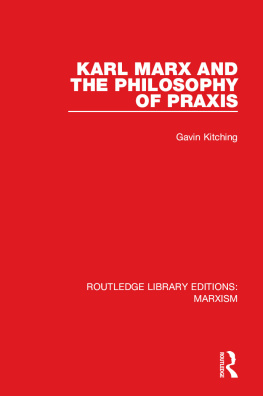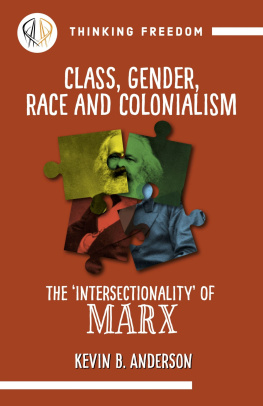Marx at the Margins
ON NATIONALISM, ETHNICITY, AND NON-WESTERN SOCIETIES
With a New Preface
Kevin B. Anderson
The University of Chicago Press
CHICAGO & LONDON
KEVIN B. ANDERSON is professor of sociology, political science, and feminist studies at the University of California, Santa Barbara.
The University of Chicago Press, Chicago 60637
The University of Chicago Press, Ltd., London
2010, 2016 by The University of Chicago.
All rights reserved. Published 2016.
Printed in the United States of America
25 24 23 22 21 20 19 18 17 16 1 2 3 4 5
ISBN-13: 978-0-226-34567-3 (paper)
ISBN-13: 978-0-226-34570-3 (e-book)
DOI: 10.7208/chicago/9780226345703.001.0001
Library of Congress Cataloging-in-Publication Data
Anderson, Kevin, 1948 author.
Marx at the margins : on nationalism, ethnicity, and non-Western societies, with a new preface / Kevin B. Anderson. 2nd edition.
pages ; cm
Includes bibliographical references and index.
ISBN 978-0-226-34567-3 (pbk. : alk. paper) ISBN 978-0-226-34570-3 (ebook)
1. Marx, Karl, 18181883Political and social views. 2. Nationalism. 3. Ethnicity. I. Title.
JC233.M299A544 2016
320.54dc23
2015017199
 This paper meets the requirements of ANSI/NISO Z39.48-1992 (Permanence of Paper).
This paper meets the requirements of ANSI/NISO Z39.48-1992 (Permanence of Paper).
CONTENTS
PREFACE, 2016
In the six years since this book appeared, its reception in many quarters suggests that it may have succeeded in at least one of its original aims: to present Marx as a thinker deeply concerned with non-Western and precapitalist societies in their own right, rather than as a mere adjunct to his theorization of modern Western capitalist societies. In this sense, the book may also have undercut the fashionable argument that Marx was fundamentally a Eurocentric thinker trapped in the narrow frameworks of his time, the mid-nineteenth century, and thus largely impervious to contemporary issues like race, gender, and colonialism. I refer here not only to arguments like those of Edward Saids celebrated Orientalism, but also to more broadly philosophical ones like those of Michel Foucault, for whom Marxism exists in nineteenth-century thought like a fish in water; that is, it is unable to breathe anywhere else ([1970] 1966, p. 262).
In responding to such arguments in Marx at the Margins, I readily acknowledged that some of Marxs writings in the 1840s and early 1850s did exhibit forms of Orientalism and Eurocentrism, at times implicitly supporting British colonialism in the name of progress. However, I also noted that even in the 1853 India writings, which have drawn the most attention from those seeking to portray Marx in this light, there are also dialectical countercurrents, as, for example, in his 1853 description of British colonialism in India as barbaric or his evocation that same year of Indian independence as the solution to that lands social oppression and stagnation. Even more importantly, I noted that Marx had already shifted to a more anticolonialist position by the time of his 185658 writings on India and China, during the same period that he discussed Asian modes of production in the Grundrisse.
To a great extent, however, these arguments and texts were already known to Marx specialists, especially since the 1980s, when the entirety of his New York Tribune writings were reprinted in their original English in widely accessible form in the Marx-Engels Collected Works. Therefore, many reviewers and readers have commented upon the fact that Marx at the Margins also bases its argument on little-known notebooks on non-Western and precapitalist societies that Marx composed during last years, 187982. These notebooks, some of which have not yet been published, are part of a vast corpus of Marx writings that will comprise 32 volumes in the ongoing Marx-Engels Gesamtausgabe (MEGA2). For the most part, they consist of excerpts from other authors, with occasional commentary by Marx.
Marxs excerpt notebooks are already known to scholars via a few examples that have been published more widely, among them the 1881 notes on Adolph Wagners book on political economy and the 187475 marginal notes on a book by Mikhail Bakunin on the state. But most of the contents of Marxs excerpt notebooks are not well known, even to specialist scholars, and to date only about a dozen of the thirty-two MEGA volumes devoted to them have appeared in print.
Some of the 187982 excerpt notebooks on non-Western and precapitalist societies have been published prior to MEGA2, and all will eventually appear in MEGA IV/27, now being edited by Jrgen Rojahn, and of which I have been one of the editors as well, particularly for the English edition. These can be divided into three areas: (1) A good number of the 187982 notebooks on non-Western and precapitalist societies address India and South Asia, North Africa, colonial and precolonial Latin America, and a variety of preliterate societies, from the Native Americans of North America to the Homeric Greeks. All of this material has been previously published, and it forms an important part of my discussion of the late Marx in . (2) A second group of excerpt notes deals with Russian history and with Indonesia, and these have not yet been published in any language. These were discussed briefly in Marx at the Margins. (3) A third group of notes deals with ancient Rome and medieval Europe, which I have not taken up because they fell outside this books scope. However, they are important for grasping Marxs overall project in this period.
A study of this 187982 notebook material as a whole, along with Marxs letters and other writings on Russia during his last years, suggests that he was at this point in his intellectual career concerned greatly with agrarian societies in transition, some of which may have been heading toward capitalism. However, he was very firm about one point in these late writings: Not all noncapitalist societies were inevitably heading toward capitalism. As discussed , at one point in an 1877 letter to Russian friends, Marx moves from a discussion of the possibilities of an evolution toward capitalism in their country in the coming period, to one of the non-development of capitalism in ancient Rome. In Rome, even though (1) the peasants lost their land and were thus separated from their means of production, (2) large landed property was formed, held by a slave-owning aristocracy, and (3) money capital was established on a significant scale, Marx notes that capitalism never developed: What happened? The Roman proletarians became not wage-laborers, but an idle mob more abject than those who used to be called poor whites of the southern United States; and what unfolded alongside them was not a capitalist but a slave mode of production (228). Of course, Marx was probably less concerned with transitions from one mode of production in a purely sociohistorical sense than with the possibilities of revolution in his own time, with whether a Russian agrarian revolution might lead to a non-capitalist form of development if, as he and Engels wrote in their 1882 preface to a new Russian edition of the Communist Manifesto, it could link up with the revolutionary labor movement of Western Europe.
What we have, therefore, in 187782 are three sets of non-capitalist agrarian societies in transition that were studied in depth by Marx: (1) Russia, with its communal villages increasingly penetrated by capitalist social relations, which were undermining the older agrarian collectivism, and where new revolutionary movements had grown; (2) India, where British colonialism had uprooted much of the precapitalist village structure and where many forms of revolt had emerged; (3) ancient Rome in transition from an agricultural system based upon a free peasantry to one based upon slave labor, and the failure there of both plebeian resistance and slave uprisings.
Next page










 This paper meets the requirements of ANSI/NISO Z39.48-1992 (Permanence of Paper).
This paper meets the requirements of ANSI/NISO Z39.48-1992 (Permanence of Paper).